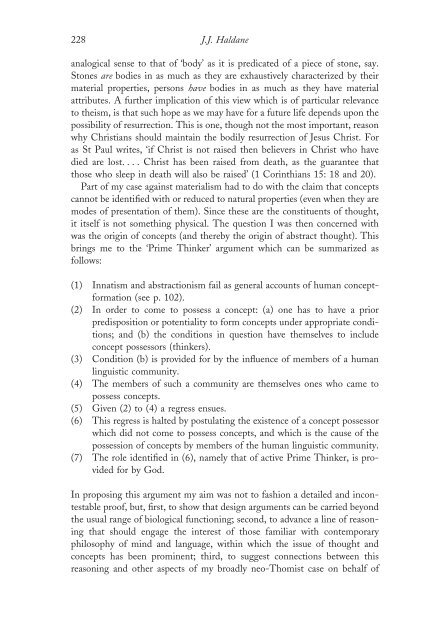Atheism and Theism JJ Haldane - Common Sense Atheism
Atheism and Theism JJ Haldane - Common Sense Atheism
Atheism and Theism JJ Haldane - Common Sense Atheism
Create successful ePaper yourself
Turn your PDF publications into a flip-book with our unique Google optimized e-Paper software.
228 J.J. <strong>Haldane</strong><br />
analogical sense to that of ‘body’ as it is predicated of a piece of stone, say.<br />
Stones are bodies in as much as they are exhaustively characterized by their<br />
material properties, persons have bodies in as much as they have material<br />
attributes. A further implication of this view which is of particular relevance<br />
to theism, is that such hope as we may have for a future life depends upon the<br />
possibility of resurrection. This is one, though not the most important, reason<br />
why Christians should maintain the bodily resurrection of Jesus Christ. For<br />
as St Paul writes, ‘if Christ is not raised then believers in Christ who have<br />
died are lost. . . . Christ has been raised from death, as the guarantee that<br />
those who sleep in death will also be raised’ (1 Corinthians 15: 18 <strong>and</strong> 20).<br />
Part of my case against materialism had to do with the claim that concepts<br />
cannot be identified with or reduced to natural properties (even when they are<br />
modes of presentation of them). Since these are the constituents of thought,<br />
it itself is not something physical. The question I was then concerned with<br />
was the origin of concepts (<strong>and</strong> thereby the origin of abstract thought). This<br />
brings me to the ‘Prime Thinker’ argument which can be summarized as<br />
follows:<br />
(1) Innatism <strong>and</strong> abstractionism fail as general accounts of human conceptformation<br />
(see p. 102).<br />
(2) In order to come to possess a concept: (a) one has to have a prior<br />
predisposition or potentiality to form concepts under appropriate conditions;<br />
<strong>and</strong> (b) the conditions in question have themselves to include<br />
concept possessors (thinkers).<br />
(3) Condition (b) is provided for by the influence of members of a human<br />
linguistic community.<br />
(4) The members of such a community are themselves ones who came to<br />
possess concepts.<br />
(5) Given (2) to (4) a regress ensues.<br />
(6) This regress is halted by postulating the existence of a concept possessor<br />
which did not come to possess concepts, <strong>and</strong> which is the cause of the<br />
possession of concepts by members of the human linguistic community.<br />
(7) The role identified in (6), namely that of active Prime Thinker, is provided<br />
for by God.<br />
In proposing this argument my aim was not to fashion a detailed <strong>and</strong> incontestable<br />
proof, but, first, to show that design arguments can be carried beyond<br />
the usual range of biological functioning; second, to advance a line of reasoning<br />
that should engage the interest of those familiar with contemporary<br />
philosophy of mind <strong>and</strong> language, within which the issue of thought <strong>and</strong><br />
concepts has been prominent; third, to suggest connections between this<br />
reasoning <strong>and</strong> other aspects of my broadly neo-Thomist case on behalf of

















